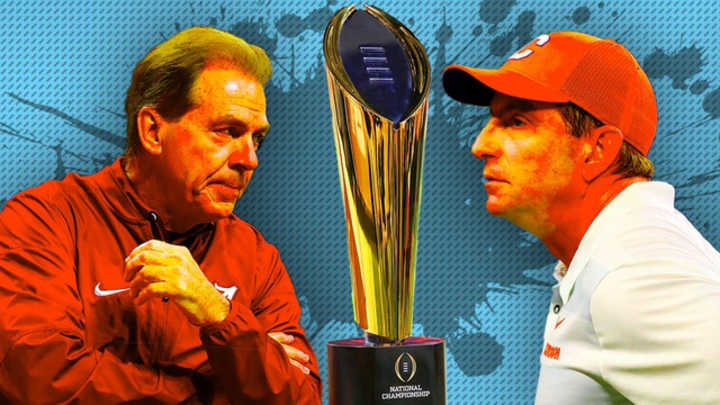We Need To Start Talking About an 8-Team College Playoff

A smart sports marketing person told me this back in June: When life-altering events—like a worldwide pandemic—occur, it takes trends that were already in place and accelerates them.
I think we’re looking at exactly that when it comes to the possible expansion of the College Football Playoff from four to eight teams.
This is the seventh year of the CFP and last Sunday the four participating teams for this season were announced: Alabama, Clemson, Ohio State and Notre Dame.
And, as has always been the case dating back to the old BCS that began in 1998, fans and media criticized the selections. Nothing wrong with that. As former SEC Commissioner Roy Kramer, the Godfather of the BCS, said: “If they are criticizing you that means they are talking about you,” he said. “That’s a good thing.”
But this year feels different.
This year there was a lot of criticism about the fundamental fairness of the overall system and whether it remains a healthy thing for college football as a whole. Specifically:
**--Since it began in 2014, a total of 28 bids have been issued to the CFP. The four teams in this year’s CFP—Alabama (6), Clemson (6), Ohio State (4), Notre Dame (2)—have 18 of those bids. Throw in Oklahoma’s four appearances and five schools have 22 of the 28 bids.
**--There are 127 schools playing at the FBS levels. Of those 65 belong to the Power Five Conferences. In seven years only 11 schools have played in the CFP.
**--With the unpredictability created by the COVID virus, there seemed to be the possibility that one of the Group of Five Conferences (AAC, Sun Belt, Conference USA, MAC, Mountain West) would get a team in the CFP for the first time.
Undefeated Cincinnati of the American Athletic Conference began the CFP rankings on Nov. 21 at No. 7. The Bearcats never lost but they never got any higher and finished at No. 8. To be fair, virus issues did not allow Cincinnati to play again until the AAC championship on Dec. 19. Cincinnati did get a spot in the Peach Bowl on Jan. 1 against Georgia but didn’t sniff the playoffs.
Coastal Carolina of the Sun Belt was one of the best stories in college football, finishing 11-0 with wins over Kansas, Louisiana-Lafayette (which beat Iowa State), and BYU. The Chanticleers finished No. 12.
AAC Commissioner Mike Aresco was so frustrated he took to the airwaves to blast the CFP selection committee.
“I think the committee is undermining its credibility with rankings that defy logic, common sense and fairness,” he said on The Paul Finebaum show on the SEC Network. “It’s clearly become the P-5 invitational.”
Now look. The selection committee has a very difficult job. There are quality people of integrity in that room and they work very hard at it. They take the protocols that are given to them and do the best that they can. And, as Heather Dinich of ESPN pointed out, the committee followed the rules they have been given. So, the committee did its job.
I have been a four-team playoff believer from the very beginning. I think anything more than four runs the risk of watering down the importance of the regular season and we just can’t do that. College football’s regular season is the best of any sport at any level. There is a weekly tension that is created, knowing that a loss could end your playoff hopes.
I’m not here advocating for an eight-team playoff. But I am advocating that we start to have a serious discussion about it soon. Do we now need it to protect the overall health of the game moving forward?
Here is the issue that has pushed me over the edge.
We just finished with the early signing period college football. According to ESPN the top five recruiting classes are Alabama, Ohio State, Georgia, LSU, and Clemson.
Sound familiar?
Now those schools deserve the credit for putting in the work. But the fact is that the elite players want to go to schools that have a legitimate chance of going to the College Football Playoffs. And with only five schools having 22 of 28 playoff bids to date, the advantage is clear.
It’s like the incumbency in politics. Once you get into the club, there are built-in advantages that aid in your re-election year after year after year.
There are so many issues that would have to be resolved and we need to start talking about them now:
**--Do you give each of the Power Five champions an automatic bid? If so, are you prepared to have an 8-4 team in the playoffs? That’s okay in the NFL. Is it okay in college football? Maybe it is. But we need to talk about it.
**--When would the games be played? The quarterfinal round would have to be played on the campuses of the highest seed. Do you play the quarterfinals the week before Christmas?
**--What about the conference championship games? Don’t even bring up the idea of doing away with them. That’s a non-starter.
**--Does the Group of Five automatically get one of the eight playoff slots? Do they have to meet certain requirements to qualify? It’s one thing to for the G5 to get a spot in a New Year’s Day Six Bowl. It’s another to get a guaranteed spot in the playoffs and the money that would come with it.
**--An important argument was made earlier this month by ESPN’s Kirk Herbstreit. And it is this: We have become so obsessed with Who’s In and Who’s Out of the playoffs that a lot of good college football stories are being missed.
My former CBS colleague Tim Brando has been making this point for more than a decade.
It is also not healthy, Herbstreit adds, to be to have all but a handful of teams go into a season with no shot at the national championship.
“We’re at a fork in the road right now on a lot of levels and we’ve got to look at some potential changes,” Herbstreit said in a recent radio appearance.
We saw what has happened to college basketball. Outside of Chapel Hill, Durham, Lexington, Ky., and Lawrence, Kansas very few people are talking about regular-season college basketball. We can’t let that happen to college football.
The CFP still has five more years to run. Don’t forget that the BCS, for all the criticism it received, lasted 16 years.
But given everything that has happened in this season that we’ll never, ever forget, we need to talk about this. And we need to talk sooner rather than later.
